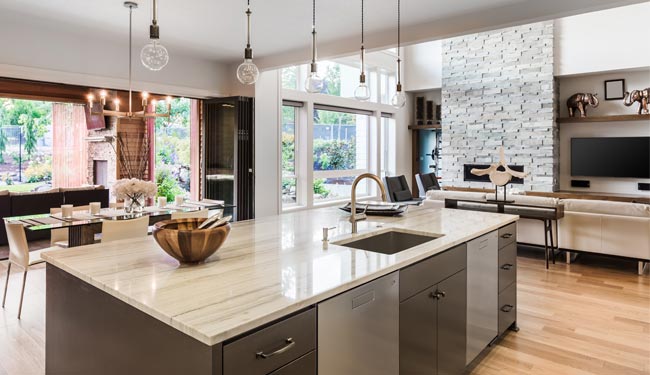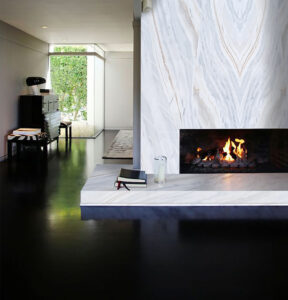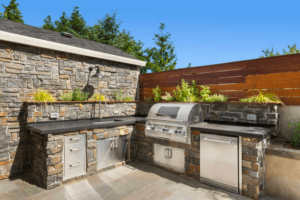Quartz and granite are two of the toughest natural materials on the planet making them the most practical and widely used materials for work surfaces. In fact, granite often contains quartz. So what are the differences between granite and quartz? Are granite kitchen worktops better than quartz? Do quartz tiles do better in wet environments? Which should you choose for your home?
Natural Vs Engineered Stone
When it comes to interior design, particularly worktops, tiles and floors, the main difference between granite and quartz is the origin story of the stone. Granite is a 100% natural stone formed over thousands of years. While quartz itself is found in nature, quartz worktops are man-made typically containing about 93% quartz with the rest containing polymer resins and colour pigments for binding.
Materials such as Silestone and Quarella are known as engineered or processed stones. Particles of quartz are bound together with small amounts of resin, creating a tough yet beautiful stone.
Granite and Quartz Comparions
Key differences between Granite and Quartz include:
Granite |
Quartz |
|
Natural stone |
100.00% |
90-97% |
Sealed |
X |
√ |
Heat resistant |
√ |
√ |
Stain resistant |
Sealing recommended |
√ |
Waterproof |
Sealing recommended |
√ |
Scratch and cut resistant |
√ |
√ |
Food safe |
Sealing recommended |
√ |
Available in tiles |
√ |
√ |
Suitable for kitchen worktops |
√ |
√ |
Suitable for bathrooms |
√ |
√ |
Suitable for outdoors |
Sealing suggested |
√ |
Looks like |
Distinctive visible grains common |
Wide range of patterns available from marble-like veining to star-speckled to glass-like |
Easy to match? |
Natural variation across slabs even from the same quarry |
Texture and colours are consistent through multiple batches |
Most common colour |
Grey |
White |
Colours available |
Black, blue, brown, green, grey, pink, red, white, yellow |
Almost every colour imaginable from pillar box red through delicate cream to night black. |
Unusual features |
One of the toughest natural substances |
Doesn’t need sealing |
Why quartz is often more affordable than granite
To create a granite worktop, a slab must be hewn out intact and then cut to fit the exact shapes. There’s a significant amount of wastage in the process, particularly as granite can vary in colour and texture within a quarry, so if you need multiple slabs you want them to be adjacent. In addition, granite is enormously heavy and difficult to transport, so the trip from quarry to stone worker to home adds a cost.
Quartz worktop manufacturers, such as Quarella or Samsung, create slabs of the right size without wastage. Transportation is typically more affordable as well, and matching isn’t a problem as each colourway is consistent. That said, some quartz worktops are complex and expensive to create, while some granite is very affordable. If you’ve got your heart set on one or the other, visit our showroom and we’ll show you all the options so you can make an informed decision yourself.
Choosing Quartz or Granite
For practicality there is little to separate the two materials either. Many believe that quartz is more durable but it is by no means invincible. Like granite it is only resistant to heat and scratches and care must be taken when using chemicals and certain food products. Granite can be used outside whereas quartz cannot as exposure to the sun damages the polymer resins.
Both quartz and granite are non-porous and therefore resistant to bacteria. They do both however need cleaning to keep them completely safe. Some types of engineered quartz have anti-bacterial coating as standard to provide additional protection. It is down to preference whether this is viewed as a benefit or a risk to health depending on individual opinions of pesticides.





